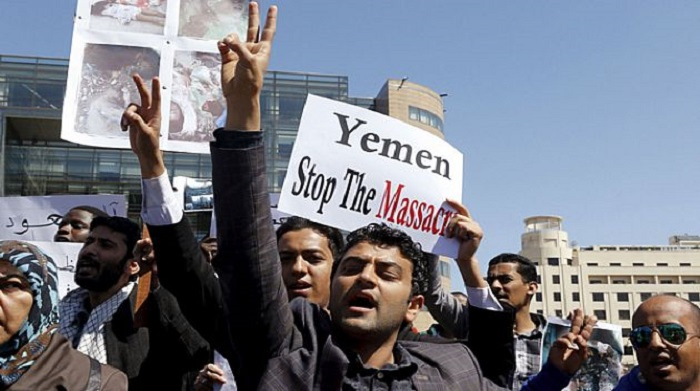Saudi Cost-Benefit Analysis of Attacks on Yemen

Several points must be mentioned regarding Saudi Arabia's air strikes against Yemen.
1- There is no doubt that, based on international laws, the attacks launched by Saudi Arabia against different regions of Yemen are considered as aggression and violation of a resolution which pursues a political solution for the crisis in Yemen. This is the first measure taken by King Salman, the new Saudi King, which shows that his approach is different from that of his predecessor, King Abdullah. Of course, the Saudis use other Arab states particularly those states adjacent to the Red Sea and the Persian Gulf Cooperation Council as a coalition team in order to reduce the volume of international pressures and justify their actions. The presence of other countries is mainly superficial and it is Saudi Arabia which launches the majority of air strikes against domestic targets in Yemen and these attacks obviously cannot be launched without the collaboration of the US. Concerns over threats against shipping in the strategic Bab el-Mandeb strait and the Red Sea is a good excuse for these attacks and receiving the US' green light.
2- The simultaneity of Saudi Arabia's air strikes against Yemen and the last round of nuclear negotiations between Iran and the P5+1 and the prediction of success in these negotiations is also very important. Saudi Arabia, as the flag-bearer of the Arab states which are concerned about the closeness of relations between the Islamic Republic of Iran and the West with the mentality that the victory of Ansarullah and its domination over Yemen will have positive impacts on Iran's positions against the western countries, had expressed its dissatisfaction with any agreement which would officially recognize Iran’s peaceful nuclear achievements.
3- If Ansarullah and the revolutionary movement in Yemen intended to return the other party to the negotiating table and gain further political concessions inside the country, perhaps their non-entrance in Aden and the complete surrender of this city would have led to their achievement of this objective from a higher position and today we would not have witnessed this volume of destruction and killing of the defenseless people of Yemen. But this has happened. Ansarullah and the Houthis must prevent the negative consequences of creating a rift between different groups and parties and tribes of Yemen. Fortunately, the regional and international atmosphere is gradually turning against Saudi Arabia by the media and the international legal organizations following the increasing air strikes against this country and the growing number of casualties.
4- Will Saudi Arabia dominate the situation in Yemen? Will the situation return to the past? Considering the fact that Ansarullah and the army of Yemen have been able to completely control the country, will Mansour Hadi be able to return to the country and control Yemen? How effective is Saudi Arabia's investments in Mansour Hadi who has no political, partisan, ethnic and popular background? One must not forget that the majority of Yemen's parliament is filled with the party of Ali Abdullah Saleh who today stands against Saudi Arabia and Mansour Hadi.
The developments of the recent days in Yemen show that the clashes will probably continue and it seems impossible that it will bear fruit for Saudi Arabia. The question is, when will these attacks end and how ready is Saudi Arabia to accept the dangers? Following these attacks, some regions are controlled by groups affiliated with al-Qaeda and the US is not satisfied with this situation. The continuation of the present situation will move the internal conditions of Yemen towards transformation into the scene of instability and anarchy; to the point where the radical and Takfiri groups will grow and make the conditions more difficult for the US and Saudi Arabia, particularly their accessibility to the sensitive and strategic Bab el-Mandeb strait.
Saudi Arabia has no other solution but to enter its ground forces into Yemen in order to finalize its attacks. Perhaps this objective could be achieved after the weakening of the forces and army's possibilities and the reduction of Ansarullah’s preventive capabilities but is the entrance of the ground forces into the territories of Yemen a prudent measure? Aren't the fighting Houthis ready to face Saudi Arabia's forces inside Yemen? This point is also significant that the Houthis are not the only enemy of Saudi Arabia inside Yemen. Historically, the majority of the people in Yemen do not have a positive feeling toward Saudi Arabia. The upcoming developments within the next days are important and influential.

